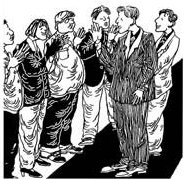 A few days ago, the standing committee of the Hunan provincial committee of the Communist Party of China (CPC) announced a decision on how local governments would receive leading officials from the provincial government. Red carpets and banners will be banned in ceremonies welcoming the leading officials, the decision said.
A few days ago, the standing committee of the Hunan provincial committee of the Communist Party of China (CPC) announced a decision on how local governments would receive leading officials from the provincial government. Red carpets and banners will be banned in ceremonies welcoming the leading officials, the decision said.
I was shocked when I read the media report on the move. I knew that red carpets were used on diplomatic occasions to honor visiting state leaders from other countries, but never learned that they were also used in local governments' reception of officials at higher levels.
Going for grand, ostentatious styles for departure or arrival when traveling to places within their jurisdiction used to be an essential part of the Chinese traditional culture of officialdom. The practice was abandoned when the CPC-led revolution succeeded in 1949. The Communist leaders regarded it as dishonorable behavior of lording over the common people.
In the past two or three decades, however, local officials seemed to have resumed interest in the old practice. They attach great importance to greeting officials from leading organs at higher levels. Usually, the top leader of the locality will go to the airport, railway station or highway exit to wait for the superior. At the scene, banners and streamers will be posted at roadsides or across streets expressing welcome. Failing to do so would be regarded as being disrespectful - actually, there have never been such a failure to do so.

It may be understandable that measures be taken to accommodate the visiting leaders with better lodging and meals, given the greatly improved local financial conditions brought along by the strong economic growth in the past decades. But it is shocking to learn that red carpets are used for such occasions. I never knew that the ceremony for the local reception of domestic guests had reached a level comparable with foreign diplomatic etiquette. I must admit my slowness in the updating of my knowledge of bureaucracy.
What is the purpose of leading officials visiting localities? In most cases, they go there to check the performance of local officials or investigate local conditions. In either case, contacting officials at the lowest level and the masses for first-hand information is necessary. But how can they access the grass roots if they keep setting their feet on the red carpet?
I remember seeing a photograph of the late Chairman Mao Zedong chatting with country folk, with a pair of bare feet covered with mud. He had been inspecting the growing of grain in a paddy field. I don't know if Mao was ever treated with a red carpet reception when touring provinces, but I'm sure I never saw any photos of current provincial leaders with muddy, bare feet.
Leaders at the provincial level are very important in the management of Chinese society. They have great powers of decision making, yet they are far away from the grass roots - rural villages, urban neighborhoods, industrial workshops, schools and groceries. They must base their decisions on information from the ground. They can get the information by listening to reports from officials at lower levels; but they need to check the authenticity of the information by visiting the grass roots occasionally. They also need to obtain first-hand information as much as possible to ensure their decisions are rational and scientific.
The Hunan CPC committee has made a wise decision, which also requires provincial leaders to be alert to false reports from local officials and asks them to make more on-the-spot investigations by contacting the masses. The decision also rules that the leaders' entourage be reduced and expenses be cut.
Hopefully, other provinces will make similar decisions that will be carried out in earnest.
E-mail: liushinan@chinadaily.com.cn
About the author:
刘式南 高级编辑。1968年毕业于武汉华中师范学院(现华中师范大学)英文系。1982年毕业于北京体育学院(现北京体育大学)研究生院体育情报专业。1982年进入中国日报社,先后担任体育记者、时政记者、国际新闻编辑、要闻版责任编辑、发稿部主任、《上海英文星报》总编辑、《中国商业周刊》总编辑等职。现任《中国日报》总编辑助理及专栏作家。1997年获国务院“特殊贡献专家政府津贴”。2000年被中华全国新闻工作者协会授予“全国百佳新闻工作者”称号。2006年获中国新闻奖二等奖(编辑)。
相关阅读:
Officials should channel spirit of Bethune
Protecting farmers from callous frauds
Higher pay for mountain top teachers
Reward job creators more sensibly
